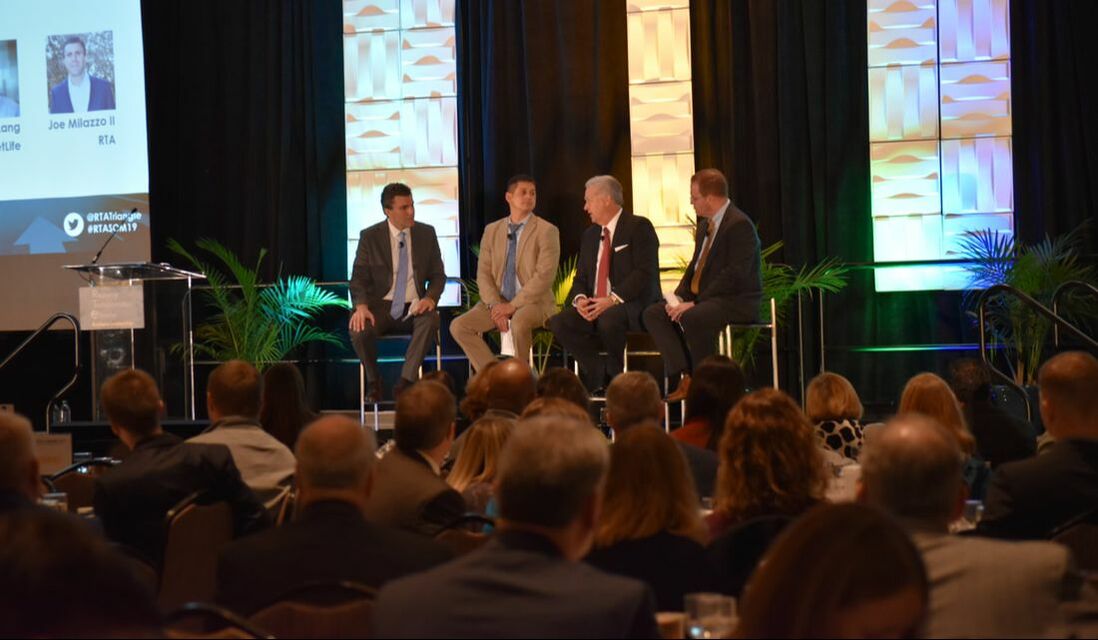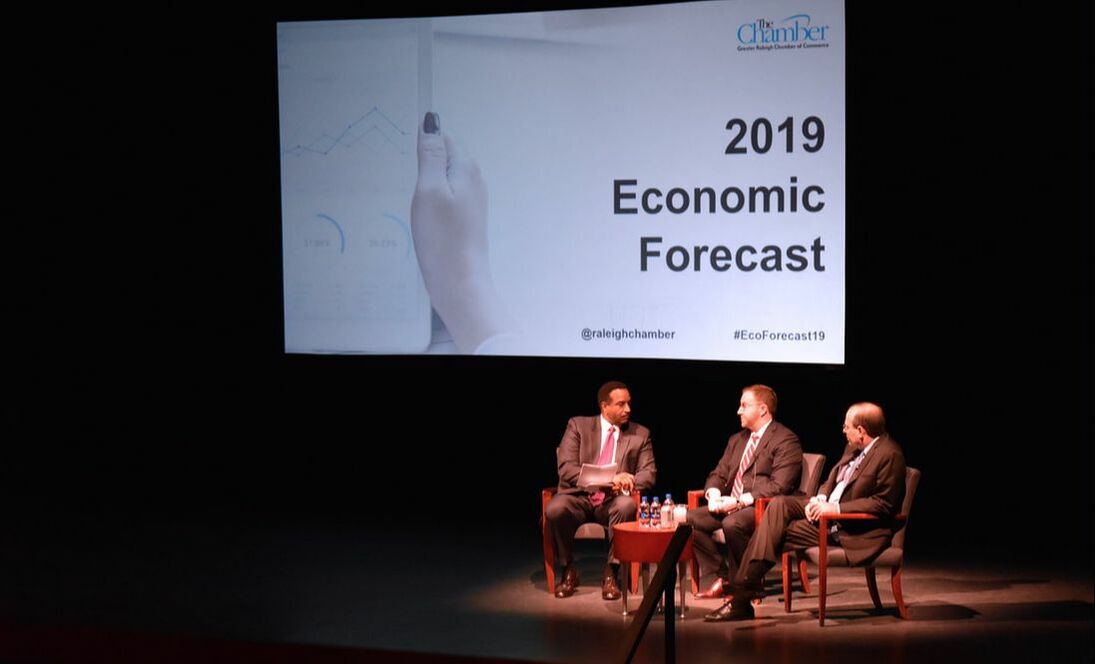|
Every day, you start from home and head to work. Hopefully, your trip goes smoothly and you don’t run into any traffic!
What you may not be thinking about during your travels is how the regional business community is looking every day for ways to make your journey quicker and easier. That’s where the Regional Transportation Alliance, a program of the Raleigh Chamber, comes in. They know that, when figuring out the future of Triangle transportation, there truly is no finish line. More initiatives, more innovation, and more inspiration always will be necessary! No finish line also is the mantra used by the NC Courage, who completed a dominant season by winning the NWSL championship and the Women’s International Challenge Cup. To show what that means to this community, RTA awarded the Courage with the 2019 Regional Inspiration Award. Jessica McDonald, the NWSL championship MVP, accepted the award on behalf of the team at the RTA 17th Annual Meeting – The State of Mobility 2019. She also appeared in this video, along with RTA staff and members of the RTA Steering Committee. Now that you’re fired up after watching the video, let’s tackle transportation! We, along with RTA, were pleased to welcome Mike Fox, chair of the North Carolina Board of Transportation, as the keynote speaker for RTA’s Annual Meeting. “2018 was a busy year for us,” said Fox. “It was a year of major accomplishments.” He referenced the anticipated opening in a couple months of the Bonner Bridge in Dare County on the Outer Banks. Fox also talked about the passage of the Build NC legislation, which accelerates some local and regional road projects across the state. He then discussed some of the federal grants North Carolina received in 2018, and the state’s response to Hurricane Florence which resulted in 2,468 cumulative road closures. Fox also shared plans for the future. “We will keep the momentum going,” he said. With more cars on the road that are electric or hybrid (and the discussion of autonomous, self-driving cars), Fox said there needs to be more attention on the impact to revenue from the motor fuels tax. “We need to discuss how we go about funding transportation moving forward,” he said. “With cars changing, our revenue from the motor fuels tax will go down.” Fox concluded by saying that efforts will continue to improve how the state delivers projects that communities want, need, and will use. Following his address, RTA Executive Director Joe Milazzo II spoke about The State of Mobility. He summarized RTA’s top five priorities.
Milazzo said 2018 was a great year for RTA and the region. RTA grew as an organization to more than 110 members, including 74 at the Leadership and Bronze levels. That marks a 50 percent increase since 2014. Also, Milazzo mentioned how RDU Airport is experiencing significant growth. “RDU is on an absolute tear,” he said, referencing the now 11 air carriers at RDU and how Frontier Airlines has gone from three to 32 summer destinations in 18 months. “The airport had the highest number of passengers last year by far,” said Milazzo. He also talked about challenges that are ahead for 2019 and beyond. “The new draft state transportation plan is brutal from a scheduling standpoint,” said Milazzo. He said it would end up delaying many major projects in our region and statewide, including the US 1 conversion to freeway north of I-540, the US 70 conversion to freeway west of TW Alexander, improvements to US 64 west, and the widening of the Wade Avenue freeway. Milazzo encouraged the business community to focus on areas where it could make an impact including finding funding solutions, joining the “Let’s Make I-40 Better” Action Team, and participating in traffic studies such as the analysis of Capital Boulevard between the beltline and I-540. The event then concluded with an executive panel including Milazzo, Bobby Lewis, chief operating officer for NCDOT, Bruce Sargent, RTA 2018 chair and the director of IBM North America Real Estate and Strategy Operations, and Geoff Lang, RTA 2019 chair and the vice president and general manager of MetLife’s Global Technology Campus in Cary. We want to join with our partner, RTA, in thanking the presenting sponsor of The State of Mobility 2019, the Research Triangle Foundation of North Carolina. Thank you, also, to all of the speakers for their great insight, and to all of the RTA major investors and sponsors who made this event possible. Finally, we also want to thank Brios Media for producing the great video! The State of Mobility generated a lot of interest and discussion in our area. Our official Twitter hashtag, #RTASOM19, was among the top trending topics that day in the Raleigh area. Don’t forget to be on the lookout every Thursday at 3 p.m. for RTA’s Thursday Thoughts at 3, a weekly series that offers perspectives on regional transportation issues. You can find it on RTA’s blog site. If you are not yet an RTA member, we encourage you to join them. Check back later on our events page to find out more about the next RTA event, the RTA Transportation Breakfast, which will be held on July 12.
0 Comments
(Click here for WRAL’s stream of the event.)
Every January, we are proud to kick off the year with a look at our region’s economic forecast and how it could impact your business. This year, we were pleased to bring you the insights of two economic experts. We heard from Tom Barkin, the president and chief executive officer of the Federal Reserve Bank of Richmond, and Charlie Dougherty, a vice president and economist with Wells Fargo Securities. Judging by their predictions for our region, there is a lot to be optimistic about in the Triangle. “I hear constantly about all the people who are coming to Raleigh and I believe this trend will continue when you have such strong employment growth and a broadening labor force,” Dougherty told the audience at the Duke Energy Center for the Performing Arts. Barkin opened by talking about the importance of being “on the ground” in the district he represents, which stretches from Maryland to the Carolinas. “During the past year, I’ve done just that, traveling pretty much nonstop,” he said. “I am in North Carolina every month.” Barkin said there are areas in the district that are thriving and some that are struggling. “For example, there are large disparities in employment, education, and earnings between urban and rural areas, and also within urban areas,” he said. “In North Carolina, about 36 percent of adults in urban areas have at least a bachelor’s degree, compared to just 20 percent in rural areas.” Barkin told the audience that stronger growth is a sign of a healthy economy. “Stronger growth creates revenues to reduce the federal budget deficit,” he said. “It improves everyone’s living standards. But, Barkin encouraged more productivity growth and said the first step is to look at policies that could draw more people back into the labor force. In particular, he said policies need to encourage more women to participate in the workforce, including the availability of paid leave and subsidized child care. “Women’s labor force participation, after rising steadily for four decades, leveled off and then began to decline around 2000,” said Barkin. “This is a divergence from other developed countries.” Overall, he said the economy’s numbers look strong, but business sentiment “has weakened considerably.” Dougherty echoed those thoughts, saying there has been a shift in sentiment. He said labor market conditions remain incredibly strong. “Low unemployment and rising wages will be the driving force behind consumer spending and overall economic growth in 2019,” said Dougherty. He pointed out that Raleigh and Charlotte are among the top 15 fastest growing metros and that tech is driving much of that growth. “We think, once the numbers come in, Raleigh and Durham probably added about 28,000 new jobs in 2018 and expect about 24,000 new jobs in 2019,” said Dougherty. He also discussed the impact of the housing market, saying that home prices are still a bargain in the area. “Home price appreciation represents a balanced housing market,” said Dougherty. He said that vacancy rates in Raleigh are decreasing. “That reflects the strong economic growth that we are seeing,” said Dougherty. He continued the discussion about the housing market in the panel discussion, which was moderated by WRAL-TV Anchor/Reporter Gerald Owens. “The housing market is one of the most interest rate-sensitive parts of our economy,” said Dougherty. “But the demand for housing will be so strong.” We want to thank all of our speakers at Economic Forecast for their great insight into our region’s economic future. Their predictions show we have a lot to be excited about here in the Triangle. We also want to thank our sponsors. Your support and partnership with the Chamber makes an event like this possible. Our Economic Forecast generated a great amount of interest and discussion on social media. The official Twitter hashtag, #EcoForecast19, was the top trending topic in the Raleigh market for more than 24 hours. The hashtag also had more than 3.6 million Twitter impressions during that time period. You can read Barkin’s address here. You also can view Dougherty’s presentation slides here. Please also join us at our Partners Dinner on Feb. 21. This event celebrates the partnership between our elected officials and the Triangle’s business and community leaders. We also are excited to hear from this year’s keynote speaker, Vivian Howard. She is the founder of Chef and the Farmer in Kinston, N.C., and the Peabody Award-winning creator of the PBS television series, A Chef’s Life. We hope to see you there! What economic conditions and trends will impact the business climate in Raleigh and the Triangle region in 2019? Hundreds of people gathered for the Chamber's 2019 Economic Forecast Thursday, Jan. 10, to find out.
Speakers included:
You can watch the live stream here. |
AuthorGreater Raleigh Chamber of Commerce Archives
July 2024
Categories
All
|
|
Greater Raleigh Chamber of Commerce
800 S. Salisbury St. Raleigh, NC 27601 |



 RSS Feed
RSS Feed